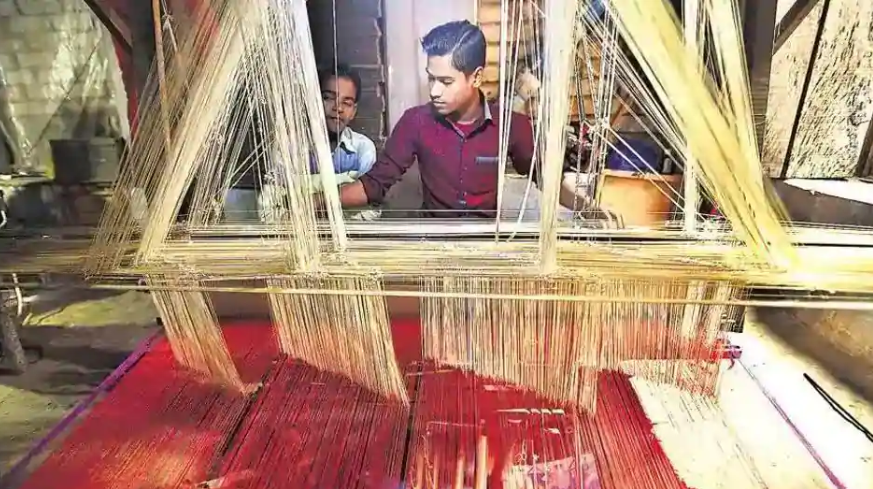Varanasi Weavers Called Off Stir After UP Govt Assures Flat Power Tariffs Till July 31

Image Courtesy: Hindustan Times
Lucknow: Thousands of agitating powerloom workers in Prime Minister Narendra Modi's constituency, Varanasi, called off their agitation and resumed work after the Uttar Pradesh government accepted their key demands related to power tariffs.
The weavers, who began an indefinite strike on September 1, under the umbrella of Uttar Pradesh Bunkar Mahasabha and Varanasi-based Biradarana Tanzim, were demanding restoration of monthly flat rate or fixed-rate electricity bill and settlement of electricity dues for the powerloom sector among others.
A delegation of the agitating weavers met N Sehgal, Additional Chief Secretary, Ministry of Micro, Small and Medium Enterprises (MSME), at the protest site for talks, following which they decided to call off the protest temporarily.
"The government has agreed to three of our key demands. The agitation has been called off after an assurance was given by N Sehgal. It has been decided that till July 31, the electricity bills will be charged based on the system of flat rates. The problem in the bills will be rectified and no one's electricity connection will be cut. From August 1, the new system will be implemented after discussions with representative of weavers. The weavers have ended their strike," Iftekhar Ahmed Ansari, president of the Uttar Pradesh Weavers' Association, told NewsClick. He said Sehgal had asked for 15 days’ time to sort out the matter and would sit with weavers' union and set a roadmap.
"Our other demands were also heard, and we were assured that wrong bills will be rectified. No connections will be cut. The new system will be implemented from August 1 (with retrospective effect) which the weaver and the government will decide in consultation."
When asked about further details of the new tariff policy, Ansari said: “Under the flat rate scheme, Rs 150 each was fixed for every powerloom. But, now weavers are made to pay per unit electricity every month. For example, if a powerloom consumes 300 units, the weaver will have to pay for all 300 units. But we have been made sure that till July 31, we will have to pay our electricity bill as per the monthly flat rate or fixed rate. But after August 1, they will probably increase the tariff from Rs 150 to Rs 300 but it will be a fixed rate not per unit."
Idris Ansari, president of Bunkar Dastkar Adhikar Manch, and other leading members of the unions said a strategy would be evolved to intensify the stir further if the government does not implement these demands. Weavers from across the state will collectively apply to get their electricity lines disconnected.
“Our demand is very simple, that we should be given power supply against fixed charges to run our weaving units. We had opposed the new provision of power tariff on meter reading basis, as soon as it was introduced. Our situation has worsened after work has come to a halt since the past few months due to COVID-19.”
Echoing similar sentiments, another weaver, Asif, said: “We need electricity at subsidised rates in order to survive and preserve the art of weaving, which we have been doing for generations. If the flat rate system is not restored, many powerlooms in the city would fall silent.”
Sehgal, while addressing the weavers’ gathering. said: "Discussed with the weavers of the state regarding their problem due to new system of electricity that started from January 1. Their demand was that due to COVID-19 their factory was closed, so for that period they should be charged at old rates, instead of new rates. They have some other demands as well."
"We have assured them on behalf of the government that the government will charge on the basis of old rates till July 31 and the new system will be implemented from August 1. Their electricity connections will not be cut and no action will be taken against them," Sehgal said.
Meanwhile, the new power tariff and the pandemic-induced lockdown have deepened the weavers' crisis. Several skilled weavers and artisans have been forced to look for alternative livelihoods, such as work in construction sites, sell vegetables, run e-rickshaw or confectionery shops to make ends meet.
“Weaving is an art and weavers are keepers of this art. The government should restore the flat rate to save this art. If weavers don’t get electricity at flat rate, many weavers may quit the field and look for other options to earn their livelihood. This will be a great loss,” said a weaver.
The UP government, in January this year, ended the flat electricity rate regime for handlooms and directed them to pay according to power consumption.
In protest, weavers across the Uttar Pradesh had launched a fortnightly strike on September 1 by stopping power looms to demand restoration of the fixed power tariff arrangement. The strike call was given by Uttar Pradesh Bunkar Mahasabha and Varanasi based organisation Biradarana Tanzim.
Samajwadi Party chief Akhilesh Yadav and Congress leader Priyanka Gandhi had supported the weavers over power tariffs.
There are about five lakh weavers associated with weaving of Banarasi sarees, stoles and other clothes in the city who say that the government’s move was burning a big hole in their pockets.
Get the latest reports & analysis with people's perspective on Protests, movements & deep analytical videos, discussions of the current affairs in your Telegram app. Subscribe to NewsClick's Telegram channel & get Real-Time updates on stories, as they get published on our website.
























